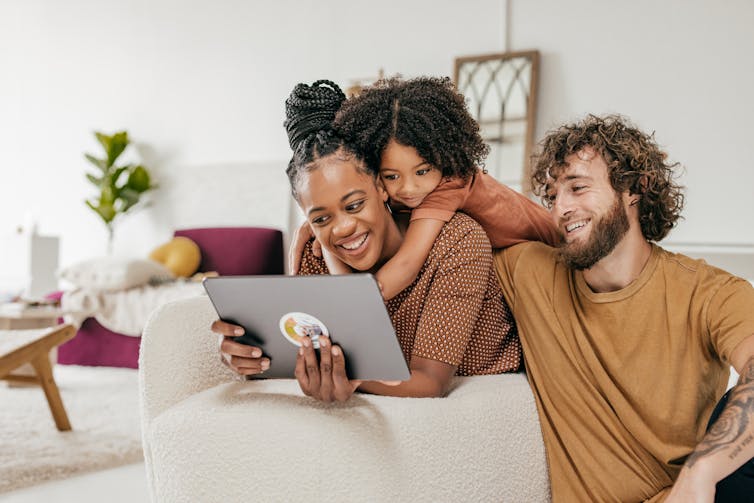
In an era where digital devices are everywhere, the term “screen time” has become a buzz phrase in discussions about technology’s impact on people’s lives. Parents are concerned about their children’s screen habits. But what if this entire approach to screen time is fundamentally flawed?
While researchers have made advances in measuring screen use, a detailed critique of the research in 2020 revealed major issues in how screen time is conceptualized, measured and studied. I study how digital technology affects human cognition and emotions. My ongoing research with cognitive psychologist Nelson Roque builds on that critique’s findings.
We categorized existing screen-time measures, mapping them to attributes like whether they are duration-based or context-specific, and are studying how they relate to health outcomes such as anxiety, stress, depression, loneliness, mood and sleep quality, creating a clearer framework for understanding screen time. We believe that grouping all digital activities together misses how different types of screen use affect people.
By applying this framework, researchers can better identify which digital activities are beneficial or potentially harmful, allowing people to adopt more intentional screen habits that support well-being and reduce negative mental and emotional health effects.
Table of Contents
Screen time isn’t one thing
Screen time, at first glance, seems easy to understand: It’s simply the time spent on devices with screens such as smartphones, tablets, laptops and TVs. But this basic definition hides the variety within people’s digital activities. To truly understand screen time’s impact, you need to look closer at specific digital activities and how each affects cognitive function and mental health.
In our research, we divide screen time into four broad categories: educational use, work-related use, social interaction and entertainment.
For education, activities like online classes and reading articles can improve cognitive skills like problem-solving and critical thinking. Digital tools like mobile apps can support learning by boosting motivation, self-regulation and self-control.
But these tools also pose challenges, such as distracting learners and contributing to poorer recall compared with traditional learning methods. For young users, screen-based learning may even have negative impacts on development and their social environment.
Screen time for work, like writing reports or attending virtual meetings, is a central part of modern life. It can improve productivity and enable remote work. However, prolonged screen exposure and multitasking may also lead to stress, anxiety and cognitive fatigue.
Screen use for social connection helps people interact with others through video chats, social media or online communities. These interactions can promote social connectedness and even improve health outcomes such as decreased depressive symptoms and improved glycemic control for people with chronic conditions. But passive screen use, like endless social media scrolling, can lead to negative experiences such as cyberbullying, social comparison and loneliness, especially for teens.
Screen use for entertainment provides relaxation and stress relief. Mindfulness apps or meditation tools, for example, can reduce anxiety and improve emotional regulation. Creative digital activities, like graphic design and music production, can reduce stress and improve mental health. However, too much screen use may reduce well-being by limiting physical activity and time for other rewarding pursuits.
Context matters
Screen time affects people differently based on factors like mood, social setting, age and family environment. Your emotions before and during screen use can shape your experience. Positive interactions can lift your mood, while loneliness might deepen with certain online activities. For example, we found that differences in age and stress levels affect how readily people become distracted on their devices. Alerts and other changes distract users, which makes it more challenging to focus on tasks.
The social context of screen use also matters. Watching a movie with family can strengthen bonds, while using screens alone can increase feelings of isolation, especially when it replaces face-to-face interactions.
Family influence plays a role, too. For example, parents’ screen habits affect their children’s screen behavior, and structured parental involvement can help reduce excessive use. It highlights the positive effect of structured parental involvement, along with mindful social contexts, in managing screen time for healthier digital interactions.

kate_sept2004/E+ via Getty Images
Consistency and nuance
Technology now lets researchers track screen use accurately, but simply counting hours doesn’t give us the full picture. Even when we measure specific activities, like social media or gaming, studies don’t often capture engagement level or intent. For example, someone might use social media to stay informed or to procrastinate.
Studies on screen time often vary in how they define and categorize it. Some focus on total screen exposure without differentiating between activities. Others examine specific types of use but may not account for the content or context. This lack of consistency in defining screen time makes it hard to compare studies or generalize findings.
Understanding screen use requires a more nuanced approach than tracking the amount of time people spend on their screens. Recognizing the different effects of specific digital activities and distinguishing between active and passive use are crucial steps. Using standardized definitions and combining quantitative data with personal insights would provide a fuller picture. Researchers can also study how screen use affects people over time.
For policymakers, this means developing guidelines that move beyond one-size-fits-all limits by focusing on recommendations suited to specific activities and individual needs. For the rest of us, this awareness encourages a balanced digital diet that blends enriching online and offline activities for better well-being.
![]()
Rinanda Shaleha does not work for, consult, own shares in or receive funding from any company or organization that would benefit from this article, and has disclosed no relevant affiliations beyond their academic appointment.























